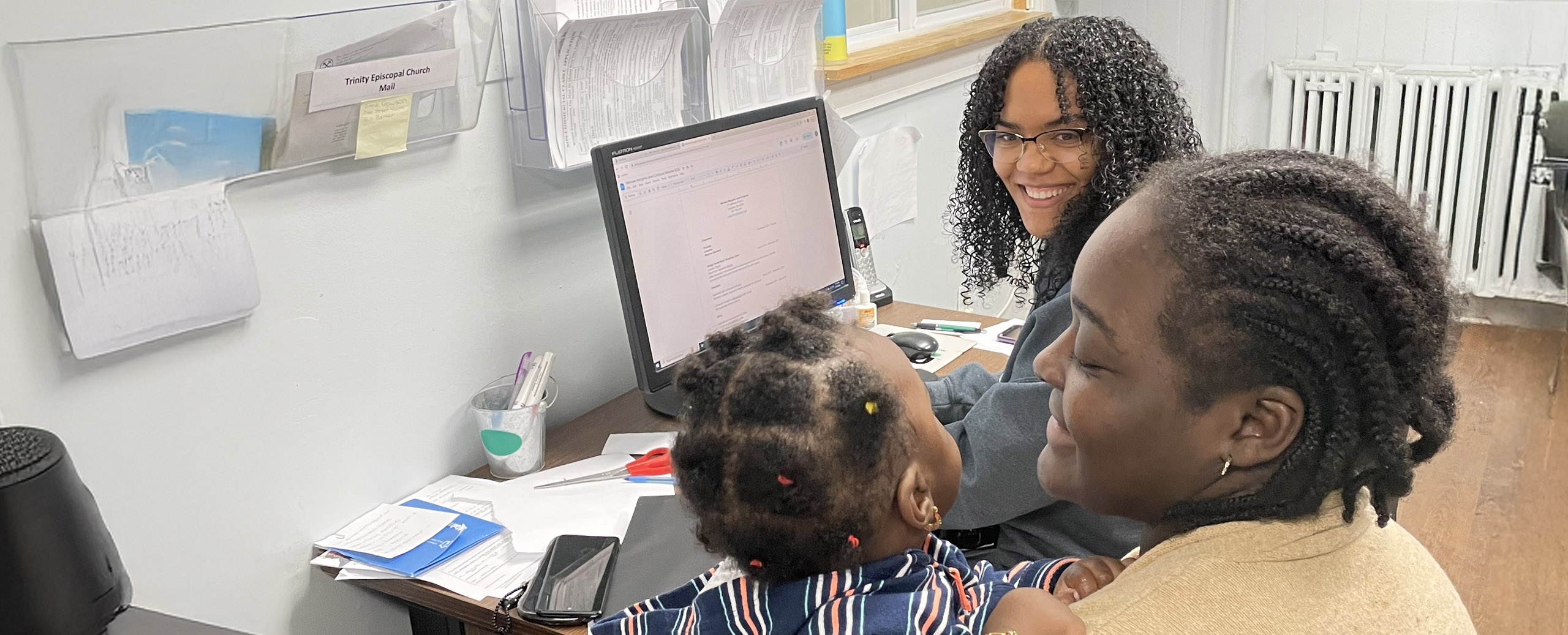2023-2024 IMPACT REPORT
Walking the Talk
A mother works on a resume and job application at Trinity Jubilee Center in Lewiston. The organization addresses the needs of underserved people by bridging critical service gaps. MaineCF’s Black, Indigenous and People of Color Fund in 2024 awarded the organization $20,000 to support its comprehensive services that provide food, diapers, shelter, medical care, mental health case management and employment assistance. Trinity Jubilee Center photo
MaineCF fundholders have supported the foundation’s work to advance racial equity since 2007, when the Black, Indigenous and People of Color Fund was started by a MaineCF donor. It has since evolved into one of the foundation’s biggest grant programs and has awarded 312 grants totaling $2.4 million.
But grantmaking alone can’t solve the state’s racial disparities.
The murder of George Floyd in 2020 served as a catalyst for donors who share a commitment to racial equity to convene with the goal of making a tangible difference in advancing racial equity in Maine. What emerged is the Racial Equity Donor Cohort (REDC), a group of fundholders who discuss ways they can leverage their philanthropy, individually and collectively, in service of achieving racial equity. It also explores more inwardly the ways their own biases and grantmaking practices enable or prohibit equity.
Like so many of the REDC participants, Betty Robinson, a MaineCF fundholder from Windham, has been engaged in furthering racial equity for decades. She believes MaineCF can inspire people to practice racial equity in their philanthropy in innovative ways. Shana Cook Mueller, a MaineCF fundholder from North Yarmouth, is passionate about leveraging philanthropy to create social impact. Carol Wishcamper of Freeport is a leader in Maine in racial equity advocacy and Wabanaki rights.
Here, a few members of the REDC share their perspectives on the unique opportunity MaineCF donors have to advance racial equity in Maine through philanthropy. The responses have been edited and condensed.
MaineCF: When you envision achievement for MaineCF’s racial equity work, what does it look like?
Shana Cook Mueller: To me, achieving racial equity would mean we no longer have racial disparities in outcomes of wellbeing and in the process, we have improved outcomes for everyone because we understand ourselves and one another better. I envision a board, staff and donors who mirror the identities of the populations MaineCF serves and are in real relationship with those communities and their service-providing organizations. I envision donors putting faith in those relationships and loosening controls over decisions about exactly how their donations are spent.
Carol Wishcamper: Racial equity is completely and fully integrated into all aspects of MaineCF, while
at the same time a clearly articulated and practiced priority focus in its grant making strategy.
MaineCF: What makes it challenging to think about racial equity as a white philanthropist?
SCM: I have worked through years of self doubt, asking questions like, “What makes me think I can fix the problem of racial inequity as a white person?” And yet, I have come to believe that if I’m a person with the ability to make charitable donations, then I have a responsibility to figure this out, in community, the very best I can.
Betty Robinson: We know we are inescapably in a position of privilege just to have the resources to share and to participate in making decisions about the “best” way to support racial equity. Unless we simply turn over our resources to others (which others?) in an attempt to abdicate this position, we must continually seek more education, listen carefully to more BIPOC voices, and consider deeply the best ways to give and to whom.
MaineCF: How can donors in the Racial Equity Donor Cohort help enact positive change in Maine?
SCM: At the heart of the goal of racial equity is that all people should have access to similar and positive life outcomes. Viewing MaineCF’s initiatives through the lens of race means considering whether and how solutions to those problems account for varied life outcomes by race. It begins with asking this very question in conversations about climate, environment, poverty, early childhood education, et cetera. Not only will this have the potential to reduce racial inequity, but it will also mean the solutions our community funds will be that much more effective for everyone.
BR: By offering to engage others with this education and by responding generously to BIPOC voices and organizations that serve diverse populations, including those involved in political advocacy for racial equity.
CW: This group can be visible and vocal, bold and brave in our advocacy and commitment to racial equity.
MaineCF: What have you learned from one another?
SCM: When I began to commit more fully to philanthropic giving a few years ago, I felt (and still fight against feeling) like an imposter. I made assumptions that most other donors involved with MaineCF have more to give than I do and that most have come to philanthropy because of longstanding multigenerational wealth. I also assumed that both those things translate into legitimacy in the world of philanthropy.
Being part of this group has allowed me to see that my assumptions were unfair and that my legitimacy as a donor doesn’t relate only to how long I have been a donor or the size of my donor-advised fund. I also learned that other donors involved with MaineCF have some incredible life experiences to share.
For more information about the Racial Equity Donor Cohort and to join this community, contact Becka Yturregui, vice president of donor engagement, at byturregui@mainecf.org or 207-412-0842.






